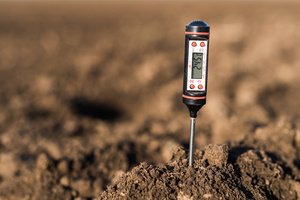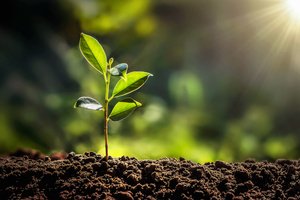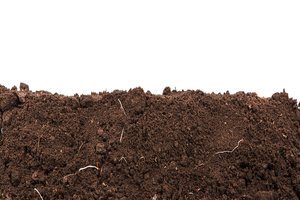Gardening is an enjoyable pursuit for many people, providing them with the opportunity to spend time outdoors and feel closer to nature. However, it certainly has its share of frustrations, particularly when your best efforts to ensure your plants are receiving adequate sunlight and water don’t seem to be enough to help them thrive. One factor that many gardeners overlook when it comes to successful crops and flowers is the soil’s pH.
Here is a look at what this measurement is and why testing it is so important.
What Is pH?

pH is a measurement that indicates how alkaline or acidic a particular substance is. Testing pH measures the number of hydrogen atoms in a substance carrying a positive charge.
A higher concentration of hydrogen ions indicates that a sample is more acidic, while those with lower concentrations of hydrogen ions are more alkaline or basic.
The pH scale runs from 0 to 14, with acidic substances falling between 0 and 7 and basic substances falling between 7 and 14. A pH of exactly 7 is considered completely neutral and is not basic or acidic.
Some of the acidic substances you may be familiar with are coffee and orange juice, while basic or alkaline substances include household cleaners and baking soda. Pure water, meanwhile, is an example of a substance that is completely neutral and has a pH of 7.
Why Test a Soil’s pH?
There are many reasons that you may want to test your soil’s pH. Ensuring that it falls within an appropriate range is vital for optimal plant growth and maximizing your crop yields because it ensures that nutrients are freely available for whatever you grow in the soil. Here are five good reasons you should test the pH of your soil.
Weather and Climate Could Compromise Your Soil’s pH

Your soil’s pH is influenced by the climate and weather in your area, particularly the amount of sunlight it gets, precipitation, the temperature and even seasonal weather changes. If your area experiences a sudden influx of precipitation, it could wash essential nutrients from the soil and make it more acidic. Similarly, water that comes into contact with decaying materials, such as leaves, in your soil can cause the pH to fall due to the release of carbon dioxide that naturally occurs in decaying matter. When carbon dioxide is mixed with water, it can form acids.
Meanwhile, areas that are experiencing a drought tend to have more alkaline soil. This is because there is less water moving through the soil, which means that the salts and minerals present within it can become more concentrated and increase its pH.
You Want to Determine the Effects of Irrigation Water on Your Soil
The type of water you use to irrigate your plants can influence your soil’s pH. Even if you already know your soil’s starting pH, you may wish to assess how it has changed over time due to its exposure to water.
If the water you use for your plants is more acidic or more basic than the soil, its pH will shift accordingly. This may occur gradually or it might be more sudden, so it is important to continue monitoring your soil’s pH so you can amend it as needed to ensure it falls within an acceptable range for whatever you wish to grow.
You Are Unsure What to Plant
If you are starting a garden for the first time or have moved to a new area and are not familiar with the local conditions, testing your soil’s pH can provide valuable guidance on the best plants for your area. Should you determine that it is not suitable for what you wish to grow, it can help you determine what kind of supplementation you need to use in your soil to help bring it into a more desirable range.
You Have Used Fertilizer on Your Soil
Many gardeners use fertilizer on their soil to maximize their crop yields. However, it is essential to check the pH of your soil both before and after adding fertilizer so you know how much fertilizer you need and what type to use. pH has a big impact on the availability of nutrients for plants.
Organic fertilizer has a tendency to acidify soil once it comes into contact with water, thanks to its soluble organic acids. Artificial nitrogen fertilizers, meanwhile, have the effect of lowering pH significantly in soil.
You Want to Ensure Optimal Nutrient Availability

When a soil’s pH is too low or too high, the plant will be unable to absorb the nutrients it needs to thrive. As a general rule, soil that is slightly acidic tends to have the most nutrients available to the plant. However, different plants have their own specific optimal pH ranges that depend on individual nutrient requirements. For example, potatoes thrive in soil with a pH of 4.5 to 6, while walnut trees prefer soil with a pH of between 6 and 8.
When a soil’s pH is too high, nutrients such as iron may become bound, which means that the plants growing in the soil will lose their chlorophyll and begin turning yellow. Alkaline soils can also experience molybdenum poisoning, which can stunt crops.
When a soil’s pH is too low, it may experience aluminum toxicity. This occurs when the aluminum is unbound and the plants growing in the soil take the metal in at levels that are toxic.
Testing Your Soil’s pH
There are many options available when it comes to testing your soil’s pH. Here is a brief overview of the top methods.
pH Test Strips
These strips, also known as litmus paper, are easy to use and affordable. They change color to indicate the soil’s pH. However, they can be difficult to read and are not as precise as other methods.
Chemical Test Kits
pH chemical test kits are similar to test strips in their ease of use, but they can be difficult to read and only test within specific pH ranges. This means multiple kits may be needed.
Digital Pocket Testers
These portable devices use a pH electrode that is placed into the soil to read its pH; the information is then displayed on the screen. They are more reliable and accurate than chemical options, but their price is higher.
Contact the Soil Experts
Every gardening project depends on the right soil for success. Whether you need high-quality soil delivered in Northern Virginia or you have questions about your soil’s pH, the professionals at Dirt Connections can help. Contact us today to learn more about our soil services.
Summary

Dirt Connections was started with one goal in mind: providing quality residential and commercial construction services to clients on time and on budget. Reach out for more information on how we can support your next project.
For your convenience our estimates are free and by appointment. Call 703-940-9949 for a free estimate today!










































